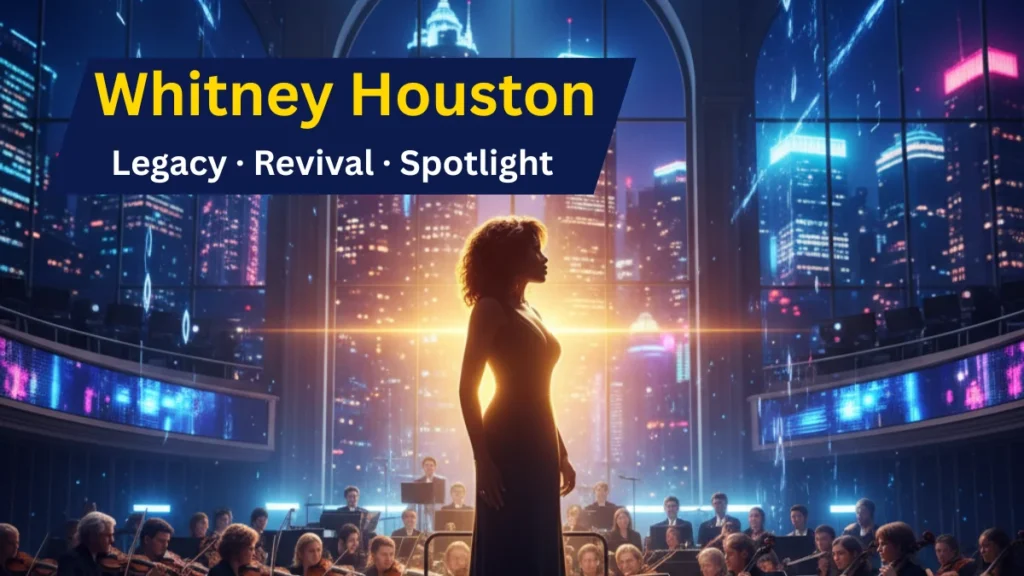Whitney Houston has been gone for 13 years. Now, thanks to AI, her legendary voice is set to return to concert halls in 2025.
A new startup says it has used cutting-edge “stem separation technology” to isolate Houston’s vocals, which will be paired with a live orchestra for a global symphonic tour. The move has reignited debate over how far technology should go in resurrecting artists after death.
Key Takeaways
- Whitney Houston’s AI-isolated vocals will headline a 2025 orchestral tour.
- Startup Moises used “stem separation” to recover lost vocal masters.
- Houston’s estate approved the project, citing preservation of her legacy.
- Critics question whether posthumous performances celebrate or exploit.
- AI in music raises new ethical debates on consent and authenticity.
Whitney Houston’s voice will return in 2025 through an AI-driven symphonic tour. Startup Moises isolated her vocals using “stem separation technology,” compensating for lost multitrack masters. The tour, called The Voice of Whitney: A Symphonic Celebration, aims to honour her legacy but has sparked debate over the ethics of posthumous performances.
A Legend Reimagined
Whitney Houston’s voice remains one of the most recognisable in music history. Thirteen years after her tragic passing in 2012, audiences will hear her again — this time, through the power of artificial intelligence.
Earlier this week, a new symphonic concert series, The Voice of Whitney: A Symphonic Celebration, was announced. The tour will feature a live orchestra performing alongside AI-isolated vocals from Houston’s original recordings.
The Technology Behind the Voice
The project relies on “stem separation technology,” developed by AI music platform Moises. This technique allows engineers to strip vocals from fully mixed tracks where the original studio masters no longer exist.
“We had to isolate Whitney’s vocals from fully mixed recordings without compromising the emotional power of her performance,” said Moises CEO Geraldo Ramos in a press release. “A concert like this simply wouldn’t have been possible five years ago.”
Unlike generative AI, which can fabricate voices or lyrics, this process repurposes Houston’s authentic recordings, re-arranged to fit orchestral scores.
Not the First Time Houston Has ‘Returned’
This is not Houston’s first posthumous tour. In 2020, BASE Hologram launched An Evening with Whitney, a holographic concert accompanied by live musicians. Similar shows have featured Roy Orbison and Maria Callas.
This time, however, no holograms are planned. Instead, the focus is entirely on Houston’s unaltered voice — now given fresh orchestral life.
Echoes of Past Experiments
Using technology to extend the careers of late artists is not new. The Doors remixed Jim Morrison’s spoken word into a 1978 album. Barry Manilow released a 2014 duets project with long-departed stars, including Houston. And most recently, Peter Jackson’s team used AI to isolate John Lennon’s vocals for the Beatles’ 2023 single Now and Then.
The difference here lies in scale: a full global tour with an AI-assisted soundtrack, marketed as an “authentic” Whitney Houston experience.
Industry Response and Ethical Debate
For some, the tour represents a touching tribute — a chance for new generations to experience Houston’s voice in a concert hall. For others, it raises thorny ethical questions.
Where is the line between honouring an artist and exploiting their memory? Can estates truly speak for the wishes of the deceased? And what does this mean for living artists, who may one day see their likeness reanimated without their say?
Critics argue that the allure of AI-powered concerts risks blurring the line between preservation and commodification. Supporters counter that such projects keep legacies alive in a digital-first music era.
Why It Matters
Houston’s return speaks to a broader cultural shift. AI is no longer confined to studio experiments — it is reshaping how music is performed, marketed, and remembered. For fans, this may feel like a gift. For the industry, it is both an opportunity and a minefield.
As audiences fill concert halls to hear The Voice of Whitney, one question lingers: are we celebrating the singer we lost, or building a facsimile for the future of entertainment?
Conclusion
AI may never bring Whitney Houston back, but it is making sure her voice is never silenced. Whether you see this as innovation or exploitation, the fact remains: technology has changed how we mourn, remember, and even “reunite” with cultural icons.
